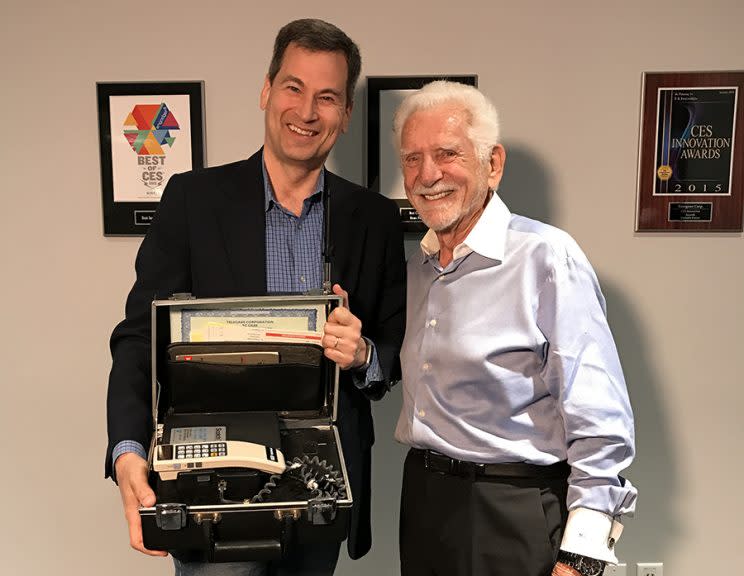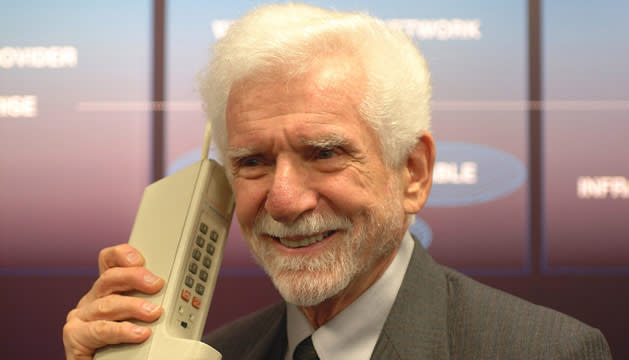Marty Cooper, inventor of the cellphone: The next step is implantables
Marty Cooper is not nearly as famous as he should be.
He’s the former Motorola engineer we can thank for advances in liquid-crystal displays, two-way radios, WiFi, and pagers.
And—oh yeah. He invented the cellphone.
He’s also funny and sharp, and, at 88, still inventing. Last month, I had the chance to chat with him in Silicon Valley.

POGUE: You are the father of, of course, the cellphone, and the pager, and MIMO Wi-Fi.

What am I missing?
COOPER: Well, you know. I’ve been in the same industry for like 100 years! Actually, only 60. So I’ve had lots of opportunities.
POGUE: Well, brag a little. What else?
COOPER: Well, some of these things you wouldn’t know about. The first radio traffic control happened in the 1950s. I built the first electronic device for ringing the telephone in a car—before there was cellular, before there were even cellphones—well, before there were any kind of phones. So you hang around long enough, and you can do a lot of stuff.
POGUE: When you’re working on this stuff, do you have any idea where it’s going to go?
COOPER: Well, you’ve got to be a good dreamer. And that’s what I do. I’m not that great an engineer, but I’m a very good dreamer.
POGUE: You’re not that great an engineer!?
COOPER: Well, you know, if you’re going to dream realities, you have to know what you’re dreaming about. The skill is ignoring reality and thinking about what really could be.
POGUE: So when you’re working on something like a pager or the first mobile phone, are there naysayers?
COOPER: Everybody’s a naysayer. Especially the bean counters. If you can’t point to getting profits and revenues in a reasonable amount of time, then they’re negative, regardless of how great the story is. But even when we had proved the cellular concept, and we were ready to go public, I had a guy from London tell me: “We think that the total market for portable phones in London is 12,000.” And it’s more like 12 million now.
POGUE: Where is that guy today?
COOPER: Yeah, exactly.
POGUE: And I’m sorry to ask this question for the thousandth time in your life, but you made the first cellphone call. Do you remember what you said?
COOPER: The first public call.
POGUE: The first public call?
COOPER: Yeah, because we weren’t going to show something to the public that wasn’t tested in a lab!
POGUE: Oh, I see.
COOPER: No, serendipitously, I was with a reporter, we were walking down the street, because that’s how I like to demonstrate mobility. People are mobile, right? That’s my mantra. And I wanted to make a phone call, and I thought, you know, I’m going to call Joel Engel, who is my counterpart at the Bell System. And the Bell System were our enemy. You know, they’re a monopoly, and we believe in competition. So I dialed the number, and remarkably, he answered the phone himself. And I said, “Joel?” He says, “Marty! Hi, Marty.” “I’m calling you from a cellphone.” “What, a real cellphone?” “A handheld, personal, portable, cellphone.” Silence at the other end of the line.
You know that I’m not above rubbing things in, but … To this day, Joel doesn’t remember that call. I guess I don’t blame him.
POGUE: I’m sure Verizon’s got a record of it somewhere.
COOPER: Yeah, yeah, no doubt. No doubt.

POGUE: Your work launched one of the biggest, most life changing, societally changing technologies the world has ever known. How do you not have this massive ego?
COOPER: Well, there are a couple of issues. First of all, I hope you know that I didn’t do it all by myself. It was thousands of other people that participated. I happened to be the first one to think about actually building one like that.
But I don’t live in the past. You know, if you’re dreaming about the past, it’s not very interesting. So I still think a lot about the future. And I’ve got more time on my hands now, so I think of more things than I ever did in the past. And it’s very exciting.
POGUE: What will the future bring?
COOPER: Well, we don’t have enough time. But I think with the cellphone industry is still in its infant period. We are just barely getting started. In fact, the whole concept of computers, memory — these are all awkward. So what I see in the future is good technology. Good technology is invisible. You don’t even know it’s there, but it serves you. And that’s what the cellphone ought to do, that’s what a computer ought to do. And so I think we are going to meld our minds with the machines.
Everybody keeps talking about they’re scared about the robots? Not really. If you think about the person of the future, his mind will be offloading the trivial things like remembering things. Computers do that so much better. And the focus for a human being will be abstracting, thinking.
But, on the other hand, when you need the memory, when you need the processing, it’s all part of your mind. No keyboards in between. And, if you could imagine a world like that, we are much, much more powerful as individuals. And then, when you add into that that we’re all connected, well, there is no problem in the world that will not be solved.
POGUE: Are you talking about implantable technology?
COOPER: Of course.
POGUE: You are? You’re a believer?
COOPER: Well, ultimately. But, you know, it’s going to happen gradually. But just think about the idea of — [grabs a phone] Does this look like a practical device? I mean, it’s flat. My face is curved. And I’m in this awkward position. So when I envision a cellphone as being a bunch of optimum devices … this does a whole bunch of suboptimal things. And so, one of them, as an example, is talking and listening. We’re never going to stop talking, especially guys like you and me. And the optimum place to put a telephone, for somebody that’s talking and listening, is let’s stick it, say, right behind your ear, right?
And have a powerful computer in it, and if I want to talk to David, I say, “Get David on the phone for me.” And they say, “Well, you want your cousin David in Pittsburgh, or David Pogue?” And I say, “No, get Pogue on the phone.” And, the next thing you know, I’m talking to you. That’s, to me, an optimum phone. You don’t have to think about it, you know, it’s just there.
And the next stuff after that, well, wait a second, now we’ve got a charging problem with this gadget behind you ear. What does your body do? Your body takes food in and it creates energy. Well, why don’t we implant this phone under your skin behind your ear? I mean, you know, ladies puncture their ears all the time. And, once you do that, you use the chemistry of the body to keep the thing going. Now, it’s a real engineering solution. Never think about it, it’s there when you need it. When you don’t need it, it’s not there. That’s my ideal.
POGUE: You really are an imaginative, forward thinker. I mean —
COOPER: Nice of you to say that. What is that you want? Every time you compliment me, I worry about that.
POGUE: A selfie, that’s all I want. I mean, I think you should wallow in what you’ve created. You and your team. I mean, the world is transformed by cellular technology.
COOPER: Yeah, there’s no question about that. The part that really inspires me is what’s going on in the emerging countries. In a place where the real advantage of connectivity is, in Africa… The fact that they can now move money around… Well, the best example is: you’ve got to a village in India. Micro-financing. A poor woman buys a cellphone. She rents time on the cellphone for the farmers around there. So the farmers, now, can call the neighboring villages, find out where the market is. Their efficiency goes up. So she’s making money, the farmers are making money, micro lenders are making money. You know, win win win.
POGUE: That’s amazing. All because of some Motorola engineer a few years ago.
COOPER: There you go. Engineers do good things on occasion. They’re a little awkward from time to time, but we love them.
POGUE: We’ll take it. Thank you, Marty.
COOPER: It’s always a pleasure, David.
More from David Pogue:
Apple polishes up 23 features in Mac OS High Sierra
The 27 most interesting features in iOS11
The DJI Spark is the smallest, cheapest obstacle-avoiding drone yet
The new Samsung Galaxy does 27 things the iPhone doesn’t
The most important announcements from Google’s big developer’s conference
Google Home’s mastermind has no intention of losing to Amazon
Google exec explains how Google Assistant just got smarter
Amazon’s Alexa calling is like a Jetsons version of the home phone
David Pogue, tech columnist for Yahoo Finance, is the author of “macOS Sierra: The Missing Manual.” He welcomes nontoxic comments in the comments section below. On the web, he’s davidpogue.com. On Twitter, he’s @pogue. On email, he’s poguester@yahoo.com. You can read all his articles here, or you can sign up to get his columns by email.

